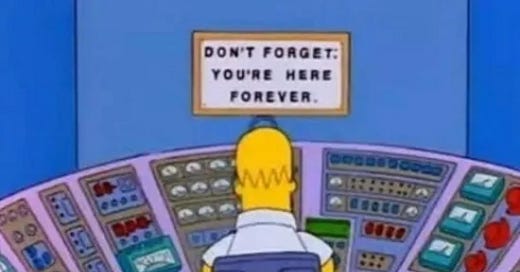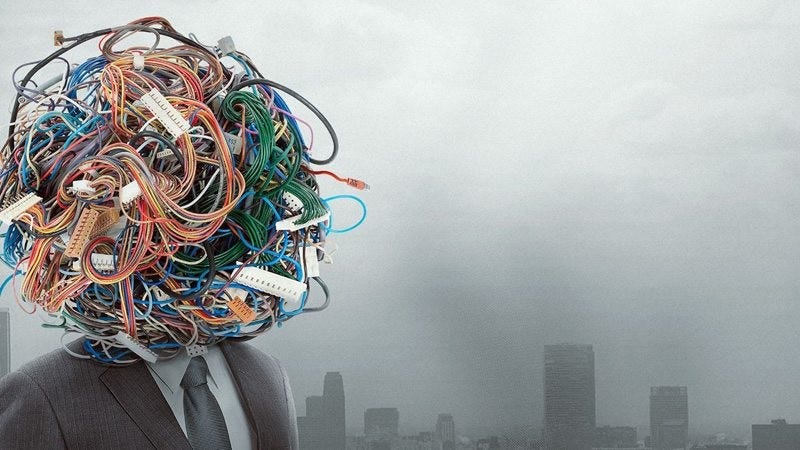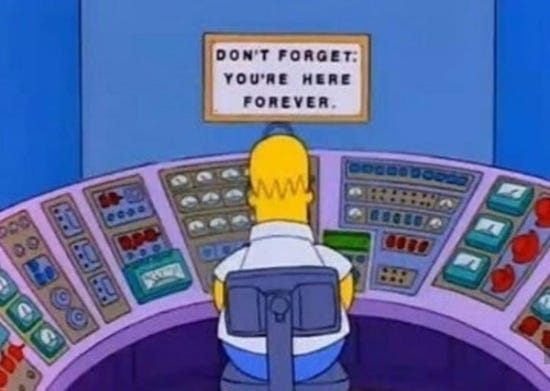New Escapologist : February 2021
Escape from the Digital World
My friend Henry is on a crusade to escape all things digital. Not just social media, but the whole shebang.
He’s deleted his blog and his profiles on Amazon, Patreon and Mailchimp. He’s even talking about scrapping his email account. “I think it will make me happier,” he says in a final BCC to his friends, “and I believe these technologies do more harm than good in the long run.”
I think he’s probably right on both counts. I took a note of his real-world address and vowed to write to him the old-fashioned way. Unfortunately, it took about a month for me to actually put pencil to paper.
After years and years of email, there’s something slightly daunting about writing a letter–a fear of doing something “wrong” by messing up a nice sheet of paper–and, if I’m completely honest with myself, something unreal about it too.
And there’s the Digital Fascism in a nutshell: the idea that if something’s not online and administered by Silicon Valley then it’s not real, which is the complete opposite of the truth. How utterly pathetic. They’ve done a real number on us. If even I find myself thinking this way (a guy who resisted smart phones for a decade and still refuses to read e-books) then the problem must be widespread indeed.
What is to stop us from escaping this over-reliance on (or addiction to) digital technologies and returning full-time to offline pleasures like real letters? I have some thoughts:
1. The sunk cost fallacy. The idea that you’ve invested in a system makes you reluctant to abandon it even if it clearly isn’t working. And we’ve invested in the digital system big-time, socially and individually. We’ve moved gradually from paper and cassettes and discs into a networked, immaterial world: it took a long time, lots of learning, plenty of head-scratching, and decades of spending on fabulous equipment. Going back to the old ways doesn’t feel profitable now even if it were logically proved as such.
2. The network effect. There are certain people who will never write to you on paper and you’ll lose touch with them forever. Some people won’t even use anything other than their favourite app to communicate. I know someone so in thrall to WhatsApp that he won’t even send text messages any more. And there were certainly one or two people I lost touch with when I killed my Facebook account it’s not in their nature to write an email. It’s a shame to lose touch with these slaves to particular technologies but the alternative is to be slave to those technologies yourself. What a sad state of affairs.
3. Too much to throw away. Many digital technologies are easy to quit because they’re rubbish or because you fall outside their demographic catchment area (i.e. you feel too young for Facebook or too old for TikTok) but sometimes they’re so perfect in terms of what you need that you’d experience genuine loss if you left them. For me, it’s Gmail. I have a proper email address at newescapologist.co.uk and the web mail interface that comes with the hosting service is fine, but the free 15GB offered by Gmail is unbeatable and I have twelve years of searchable information stored in it. It’s become a wonderful resource, almost a substitute brain, for me and I run countless searches of my Gmail account every day in search of facts, links, promises, log-in details, turns of phrase, half-forgotten nuggets. It’s too darn useful to quit. But one day, I fancy, I will.
The sensible thing is probably to half-escape the digital world, one foot in cyberspace and one on terra firma. Keep what you find useful, ditch what you don't. As I’ve said before, the Internet is not the problem but rather “Web 2.0.” So be a digital minimalist.
This said, “half-escape” is what precisely what I’ve done and, as you can see, there is really no such thing. I struggled (a bit) to write that letter, so perhaps my extremist friend is onto something. In any event, his is a noble experiment. I await a response to my letter now to find out how he’s spending his time. I’ll report back to you if he allows it.
Mr Burns as the Invisible Hand of the Market
YouTube is bursting with neat little pop-cultural essays, isn’t it?
I recently watched a good one about Frank Grimes of The Simpsons and “the cult of work.” It explains how the capitalist workplace pits worker against worker while positioning the wealthy employer as the savior.
It also points out that the dullard’s routine answer to poverty is “work harder” and, when that fails, well, hard work is good in its own right so at least you can be virtuous as well as tired.
Obviously, we’re far more like Homer* than Grimes here at New Escapologist. We have long advocated for the opposite of Grimey’s values. We say that that hard work isn’t inherently or morally valuable and that hard work evidently isn’t the answer when you consider how the rich got rich and stayed there. “Nobody earns a billion dollars,” says the essay over pictures of Mr. Burns, “they steal it from the labour of those who have no choice but to take low-wage jobs in a system that previous billionaires maintained for new billionaires.”
(*though in a key way we are not like Homer. Homer continues to work, albeit ineffectively, and reaping the consumerist “rewards” of wage slavery instead of coming up with a coherent escape plan. He does try to escape in some episodes though, doesn’t he? I might be misremembering, but in the one about Maggie’s birth, his dream was to quit the nuclear plant and work in a bowling alley; he seemed to have been maneuvering himself into this position through some sort of plan before it was scuppered.)
Check it out. If you don’t care about the exploitation of billions of people for a wealthy few, it’s still just nice to think about the golden age of The Simpsons. For all the flaws of the conservative screenwriter’s worldview, Frank Grimes’ funeral is still a great comedy moment. “Frank Grimes… or Grimey as he liked to be called.” Ahaha.
£2 off this week
If you're enjoying this newsletter, or even if you're not, there's £2 off my book The Good Life for Wage Slaves this week. Get stuck in. Use the easily-guessable code FEB2 at checkout. Offer expires Saturday 6th.
Escape from the Work Ethic Camp
Hey, look an escape!
One early evening after supper in December 2016, the winter sun throwing parallelograms of light across the prison yard, he made a run for it. Russell was a star high-school sprinter. At 6 ft 2 in (188 cm), he easily scrambled up the nine-foot fence, and in a single bound, cleared three rounds of barbed wire and landed on the other side of the wall.
It was Christmas morning when he was captured and returned to prison, with an extra year tacked on to his sentence.
This guy, Andrew Russell, physically escaped a prison called the Work Ethic Camp.
He’d been arrested for drug dealing (after finding no solution to poverty in low-paid work) and remanded to this prison. The prison’s wacky programme was to teach inmates the inherent value of work through barely-paid 30-40 hour work weeks. Needless to say, it turned out to be boring, insulting, and useless.
The story is told by Sam Haselby in Aeon magazine as part of a broader investigation into the work ethic in America and where it comes from.
The work ethic […] is a form of resignation, a product of defeat.
Attributing our exceptional work hours to an ideology woefully mistakes cause for effect. Ideology isn’t the driver of our lived experiences, but the product of them. Our ideological commitment to work is the result of incessant and repeated activity – literally doing our jobs day in and day out. And there’s nothing we do with as much regularity, intensity and unquestioned submission as work. We rationalise our quotidian experiences by shaping belief systems to accommodate them, not the other way around.
Thanks to Reader A for directing us to this. It’s a really good piece of journalism and certainly worth your time.
Don't Forget...
Ah, yes. Moments after making my original post about Frank Grimes and The Simpsons, readers reminded me that And Maggie Makes Three is a prequel episode in which Homer does in fact quit his job, albeit briefly.
He quits by riding Mr Burns through the nuclear plant while playing his head like a bongo drum. This comes after clearing his debts and lining up a low-stress dream job, so he has a decent enough escape plan too. Hooray for Homer!
Alas, all does not go to plan. When he returns to Sector 7G, tail between his legs, he’s confronted by this:
"We are alienated and have been for centuries"
That feeling of deep satisfaction at the end of a working day is rare for many workers across the world. We are alienated, and have been for centuries. We have to work in order to survive, but while we are told to love what we do and that our workplaces are our families, meaningful work that also pays the bills is harder and harder to come by.
This is a great essay from Vice. Thanks to Reader V for drawing our attention to it.
The essay points out that the way we work in this century (and indeed in the last) is neither natural nor historically normal. It goes on to ruminate on what, post-pandemic, will happen next.
What kind of change the pandemic brings is still up for debate. Joe Biden and the British government are both fond of the slogan “Build back better”, which appeals to politicians because it could mean absolutely anything. If you’re Boris Johnson, you might think that “building back better” means handing billions of pounds of public money to companies connected to the Conservative Party. Historical advances made by workers, including the creation of the weekend and shorter working days, were all hard won. There is no guarantee the pandemic will make anything easier.
It’s good, pungent stuff. Read the article in full here.
At The Sexy Coalface
Friend S responds to my sentiment that “even if your job is to eat chocolates or watch sexy films, forty hours a week for forty years of your life is a breathtaking commitment.”
She says:
Checking in as someone whose job essentially is to watch sexy films: CORRECT! The bloom goes off the rose rather quickly when you have a boss checking up to make sure you’re watching enough sexy films every week. (Also, in my considered opinion, nobody should be watching sexy films seven hours a day, five days a week.) There’s a reason I call my job “the Porn Mines” and not “The Dream”.
I’d forgotten that S’s job is in fact to watch sexy videos. She’s an office-based copywriter and some sort of content screener in what you might call the erotic industrial complex. I don’t think I was thinking of her when I wrote that; I was probably just looking for something that would be universally seen as privately enjoyable and not very work-like. But here we are. Everything is jobbable and therefore contains the potential to be a grind. See also: just because you like cakes doesn’t mean you’d enjoy running a bakery.
Should We Buy a Flat?
I've always said that the jury is still out on the issue of Renting Vs. Ownership, though I've usually come down on the side of renting.
I personally like the freedom of renting, the ability to move on, the way you're not troubled by home insurance or repairs. For 17 years, I've rented and been largely happy with those circumstances.
Strange times, however, and a weird cosmic alignment, have led Samara and me to think about buying a more permanent location for Escape Towers. It's very early days and we sure as heck don't know what we're doing. Nor are we convinced that this is the right thing to do; it's certainly against our natures.
If anyone has a "hot take" or a strong opinion in either direction, or some experience-based insight into the buying versus renting conundrum (especially from an Escapology point of view), could you drop me an email? Just reply to this newsletter or use this contact form.
I could put the edited highlights of any advice in a future edition of the newsletter, but it would also be of use and interest to me personally. Thanks in advance!
Yours with bricks and a side of mortar,
Robert Wringham
New Escapologist








